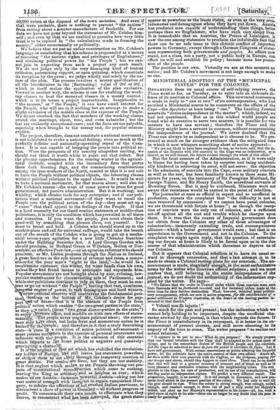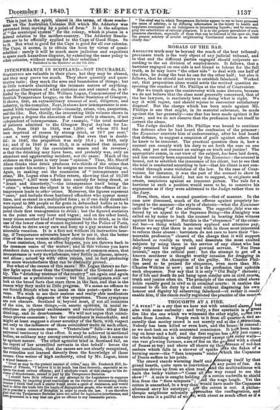MINISTERIAL ADOPTION OF THE "MUNICIPAL SYSTEM" FOR THE COLONIES.
DEPARTING from its usual course of self-relying reserve, the Times went so far, on Tuesday, as to enter into an elaborate de- fence of its-position in Colonial affairs. This unwonted concession is made in reply to "one or two" of its contemporaries who had ascribed a Ministerial source to its comments on the affairs of the Cape—the Spectator at least being "one." The Leading Journal asserts its "entire independence in the matter"; which,indeed, we had not questioned. But as in this wicked world people are found who do contrive to serve two masters, it is possible for two masters to have one servant ; therefore the Times and the Ministry might have a servant in common, without compromising the independence of the journal:" We never doubted that the Times can always be as independent as it chooses to be. We pre- sumed as much on far stronger evidence than the mitigated tone in which it now whispers something short of entire approval-
" We are not likely to have been employed to say, as we have said, that the de- spatch of the Neptune with 300 convicts to the Cape was an indiscretion, or to lament, as we still lament, the delays evident through the whole of this affair" But the faint censure of the Administration, as if it were only to blame for having been taken by surprise and being accident- ally hindered in retrieving its error, will not serve: the objection to the admission of convicts into the Cape, even military convicts as well as the rest, has been familiarly known to these same Mi- nisters for years, on the testimony of Sir Peregrine Maitland, Sir Qeorge Napier, and Sir Henry Smith, the accredited servants of Downing Street. But it may be confessed, Ministers were not aware that resistance would be carried to the point of rebellion.
The journalist at once so official in aspect and so unofficial in profession, repeats the complaint that "the difficulty is not at once removed by concession : if we cannot have penal colonies, we are threatened with forcats at home " • as though the recep- tion of convicts were the only use of colonies, and a sufficient set-off against all the cost and trouble which he charges upon them. It is true that the course of Imperial government does not obtain from the Colonies any other of those advantages of colonization—bnmensely extending trade, and consanguineous alliance—which a better government would,earn ; but that is an opprobrium to the Government and. not to ihe Colonies. To the complaint we might again reply, that the mination of entertain- ing our foreats at home is likely to be forced upon us in the due course of that administration which threatens to deprive us of our Colonies.
But it appears that Colonial rebellion is-to,.have,4taftonal re- ward in thorough concession, and that ainst attenaptuis to be made to obtain a Colonial resting-place Lppnrpo)gie4,491The an- , pa;. And we must ppeudence of the nglincement is made, singulti43r. spnktegthoritative ,terms by the writer who djitYMR INV Ai:infest that, still believing iff-pr 1.ientire,
Journal, we dobniit'd6ulitthetfni4nn city of epformation sup- flied by the writer.' `Hfiittiol-
‘.'We,beliti,ielhat the • ordt+YiiVotiiiett'iin4er which these cowiiiite. from Bermuda will beforthwith revokeit'Ind the necessary orders -made at the same tiros for,their further destination: 'That; however, *inked 'lame prelirai- oarY arrangements, which are now inactive progress, foi• the establishment of a ...penal settlement In Wellierli Australia, at the .deetre tbejeading parties in-
terested" hi that distriet " ' • ;et
" VOlenti nohfit injuria!" . squil at So Mitch for the past and present ; but theindkationiwhich we cannot help, holding to be important, despite the unofficial cha- racter Avowed by. the journal, is that which regards the future. If the Times is unsatisfactory in its retroopect, it.is better-in-its an- • nouncement of present courses,- and still more cheering in its augury of the time to come.. The writer proposes "to realize our
actual relations." -• '-
" It appears to be put to What do you propose?' We simply propose that our .formal relations with the Cape shall be adapted to the actual state of things, and to the concordant desires of the British people and the colonists. Let the Cape be admitted to have defers the power it exercises de facto. Let it have self,governnient. With certain reservations on"lots affecting the Imperial
-power, lit the colonists have the entire control oft. own:affairs. • Above all, "
kt thent-settle their own quarrels with the Coyfres' or the Griquas, paying for our troops and stores, should they happen to want them. There can be no doubt ,finit this will lead to a greater economy of treasure and of blood, as well as to more pleasant and creditable relations with the neighbouring tribes. The end gration to the Cape, its rate of production, and its use of our manufactures, will ubtfiagunder an independent regime. We predict a very different result. The proposition, happily, is no novelty. It is old enough in discussion, and now pre- sents-itself afresh in the present position of the colony. We had only to wait till .the pear should be ripe. When the colony is strong enough, wise enough, united „enough, and resolute enough, to drive out of port a ship under herMajesty's orders, and shut up her Majesty's representative in his house—all, too, with a good show of right on its side—there can no longer be any doubt that the pear i5 ready for gathering." This is just in the spirit, almost in the terms, of those resolu- tions on the Australian Colonies Bill which Mr. Adderley was prevented from moving by a point of form.* It is the adoption of "the municipal system" for the colony, which it places in a federal relation to the mother-country. The Adderley Resolu- tions are to be officially- applied to the Cape of Good Hope. So be it. But what is good for the Cape is good for all our colonies. The Cape, it seems, is to obtain the boon by virtue of quasi- rebellion : surely it will be much more judicious and expedient to spare such hazardous disputes, by extending the same policy to other colonies, without waiting for their rebellion? • Published in the Spectator on the 7th July.



























 Previous page
Previous page